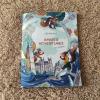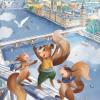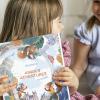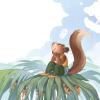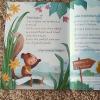The World Her Father Wrote
A Magical Childhood — When the Trees Were Tall
I keep coming back to the way childhood felt — and it always slips through my fingers before I can fully catch it. It wasn’t loud or spectacular. It wasn’t even particularly memorable on the surface. But it was strange, and soft, and full of details that meant nothing at the time and everything now. Trees looked taller. Time moved slower. The rain smelled different — sweet, almost like metal. And there was this constant sense that the world was hiding something, if only I could find the right angle to look at it.
This story starts in one of those moments you never notice while they’re happening. A little girl — her name is Alisa — was walking with her father through a London park. Nothing fancy. The ground was damp. Pigeons were fighting over a sandwich crust.
People rushed past without looking up. You wouldn’t have remembered it if you’d walked by.
But she did. Because that’s when she saw a squirrel dragging a half-eaten hamburger through the grass. It was hilarious in the way only real life can be — clumsy, ridiculous, stubborn. But Alisa didn’t laugh. She tilted her head and stared as if she was watching a scene in a film only she could understand.
“Maybe,” she said quietly, “she’s taking it somewhere. Maybe it’s a present. Maybe she’s going on a journey.”
Her father — Ilja Ashmin — didn’t correct her. He didn’t explain ecosystems or animal behaviour or any of the things adults tend to explain. He crouched next to her, eyes following the same squirrel, and asked, simply, “And where do you think she’s going?”
It was nothing, really. A question. A game. But those are the things stories are made of. They never arrive with trumpets.
They sneak in disguised as small talk and then refuse to leave.
Where Worlds Begin
That night, and the next, and the one after that, Aman — that was the squirrel’s name now — came back in stories before bed. Maybe he met a parrot who spoke seven languages. Maybe he carried a message across the rooftops. Maybe he just sat under a chestnut tree and dreamed of the sea. None of it had to make sense. In fact, the less sense it made, the better.
Ilja wrote everything down. He never said, “That’s silly.” He never asked for logic. He treated each wild idea like it was a piece of treasure. And slowly, almost without them noticing, a world began to take shape. Jack appeared — clever and impatient.
Lucy followed — always humming, always hopeful. What began as bedtime rambling turned into a living, breathing universe.
A Book on the Table
One afternoon, without any warning, there it was. Alisa came home and found her father waiting for her at the kitchen table.
He said nothing — just slid a book towards her, the corners still smelling faintly of glue and ink.
It looked ordinary. Modest. But when she opened it, she saw herself — or rather, the world she had dreamed — staring back.
Aman was there, and Jack, and Lucy. Everything she had once whispered half-asleep now lived on printed pages.
On the first page, a single line:
“To Alisa — who inspired me to write this story.”
That’s all. But those words held more weight than any speech could. And then, tucked between the pages, something else — a small envelope sealed with a golden acorn.
It was a letter. Not from Ilja. From Aman.
“Dear Alisa,” it began, written in looping script, “our adventures have only just begun. There are mysteries to solve, friends to meet, and stories that haven’t been written yet. I’ll need your help — and the help of other brave travellers like you — to finish them.”
It wasn’t a gimmick. It was part of the story — a bridge between the world in the book and the one she lived in. Children who owned the book could write back, send drawings, invent new chapters. The story didn’t end when the last page was turned. It kept going — out into the real world, waiting for new imaginations to feed it.
When Childhood Was Slower
There was a time — and I suppose I’m old enough now to say “back then” — when childhood felt slower. Nights ended with a story read aloud, not a video autoplaying. Pages turned instead of screens swiped. And imagination… it had room to stretch. It could wander without bumping into the edges of an app.
That world isn’t gone, not really. It just needs a hand to find its way back. Books like this help. They’re not just stories — they’re invitations. They say to a child: your ideas matter. They say: the world isn’t finished yet — come help build it.
The Echo of a Squirrel
Now, children who have never met Alisa know Aman’s name. They draw his adventures in crayon. They write letters to him and wait for replies. Some fall in love with Lucy’s bravery, others with Jack’s quick thinking. They step into a story that began with a squirrel and a hamburger, and they carry it further than it was ever meant to go.
Alisa is older now, but that spark never left her. She knows now — and maybe we all need reminding of this — that love isn’t just a feeling. It’s an action. It’s listening when a child says something that doesn’t make sense and deciding that maybe sense isn’t the point. It’s taking their dream seriously enough to build a home for it.
The Last Page (Or Maybe the First)
Sometimes, when Alisa reads Aman’s Adventures in London to her little friends — one on each side, breathing quietly, drifting towards sleep — she thinks about that day in the park. About the squirrel and the hamburger and the question that changed everything. She thinks about the letter, too, and the way it felt to hold it — as if a door to a different world had opened just for her.
And maybe that’s what this story is really about. Not the talking animals or the clever plots. Not even the adventures. It’s about the way a single “what if” — spoken by a child on an ordinary afternoon — can ripple outwards and touch lives you’ll never see.
Perhaps every story begins like this. Not with a polished manuscript or a publishing deal, but with a child leaning closer and whispering, “What if…?” And somewhere, a parent who hears it and answers, “Let’s find out.”
Aman’s Adventures in London, written by Ilja Ashmin and inspired by the boundless imagination of his daughter, is more than a children’s book. It’s proof that love — real, listening, patient love — can turn a fleeting moment on a park path into a world that will outlive both of them.
If you want a child in your life to feel the same wonder — to turn a simple “what if” into a world of their own — Aman’s Adventures in London is now available to order on Amazon. It’s more than a story. It’s an invitation to dream together.
Order your copy of Aman’s Adventures in London on Amazon and bring this magical story into your home.

